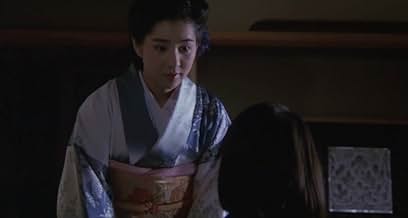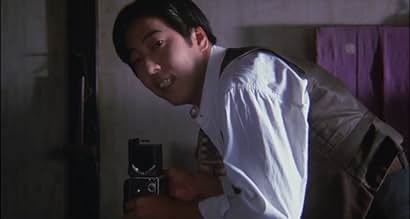IMDb RATING
7.2/10
1.8K
YOUR RATING
The orphaned Makioka sisters look for a husband for their third sister, Yukiko, as the rebellious youngest sister, Taeko, is kept waiting her turn.The orphaned Makioka sisters look for a husband for their third sister, Yukiko, as the rebellious youngest sister, Taeko, is kept waiting her turn.The orphaned Makioka sisters look for a husband for their third sister, Yukiko, as the rebellious youngest sister, Taeko, is kept waiting her turn.
- Awards
- 5 wins & 9 nominations total
Yonedanji Katsura
- Okuhata
- (as Kobeichô Katsura)
Michino Yokoyama
- Itani
- (as Michiyo Yokoyama)
Storyline
Did you know
- TriviaThe story spans the period from autumn, 1936, to April, 1941, ending about seven months before the Japanese attack on Pearl Harbor. The novel references a number of contemporary events, such as the Kobe flood of 1938, the Second Sino-Japanese War, and the growing tensions in Europe.
- GoofsTaeko is clearly wearing a strapless bra when she's in the bathtub.
- ConnectionsReferenced in Every Day a Good Day (2018)
Featured review
The Japanese movie entitled Sasameyuki (Light Snow) (1983) was shown in the U.S. with the title The Makioka Sisters. The film was based on a novel entitled The Makioka Sisters, so that change makes sense. The movie was co-written and directed by Kon Ichikawa.
The film takes place in the late 1930's, the years when Japan was a war with China. In retrospect, this was the start of WWII, but people didn't realize that at the time. There are some references to wartime scarcities, but this isn't a "homefront" movie.
The plot pivots on the marital status of the four sisters. Their parents are dead, and the oldest sister is responsible for the family name and the family honor. She's married, as is the second sister.
The third sister--Yukiko, portrayed by Sayuri Yoshinaga, is the shyest and most conservative of the four. The youngest sister--Taeko (Yûko Kotegawa) isn't as concerned about the strict rules of etiquette over which the others obsess. However, protocol dictates that she can't be married until Yukiko is married. So, much of the plot has to do with finding the right husband for Yukiko.
The film has colorful scenes of cherry blossoms and fall foliage. The glorious Japanese kimonos are worn by most women, and they are truly beautiful. (Because of the color and scenery, this movie would work better in a theater, but we had to make do with a DVD.)
Almost everything is serene on the surface of the film, but just under the surface there are intricate attachments and resentments. It's a long and quiet film, but it keeps your attention throughout.
For the record, Sayuri Yoshinaga (Yukiko) is one of Japan's greatest female actors. She starred in over 100 films. In my mind, she's the true star of this movie.
Some critics say that Ichikawa should be considered at the same level as the more famous Ozu, Kurosawa, and Mizoguchi. I don't have the depth of knowledge to know whether or not Ichikawa is the equal of the other three. However, after watching this movie, I know that he's a great director.
This film has an IMDb rating of 7.2, which is pretty good. I thought it was better than that, and rated it 9.
The film takes place in the late 1930's, the years when Japan was a war with China. In retrospect, this was the start of WWII, but people didn't realize that at the time. There are some references to wartime scarcities, but this isn't a "homefront" movie.
The plot pivots on the marital status of the four sisters. Their parents are dead, and the oldest sister is responsible for the family name and the family honor. She's married, as is the second sister.
The third sister--Yukiko, portrayed by Sayuri Yoshinaga, is the shyest and most conservative of the four. The youngest sister--Taeko (Yûko Kotegawa) isn't as concerned about the strict rules of etiquette over which the others obsess. However, protocol dictates that she can't be married until Yukiko is married. So, much of the plot has to do with finding the right husband for Yukiko.
The film has colorful scenes of cherry blossoms and fall foliage. The glorious Japanese kimonos are worn by most women, and they are truly beautiful. (Because of the color and scenery, this movie would work better in a theater, but we had to make do with a DVD.)
Almost everything is serene on the surface of the film, but just under the surface there are intricate attachments and resentments. It's a long and quiet film, but it keeps your attention throughout.
For the record, Sayuri Yoshinaga (Yukiko) is one of Japan's greatest female actors. She starred in over 100 films. In my mind, she's the true star of this movie.
Some critics say that Ichikawa should be considered at the same level as the more famous Ozu, Kurosawa, and Mizoguchi. I don't have the depth of knowledge to know whether or not Ichikawa is the equal of the other three. However, after watching this movie, I know that he's a great director.
This film has an IMDb rating of 7.2, which is pretty good. I thought it was better than that, and rated it 9.
Details
Contribute to this page
Suggest an edit or add missing content














